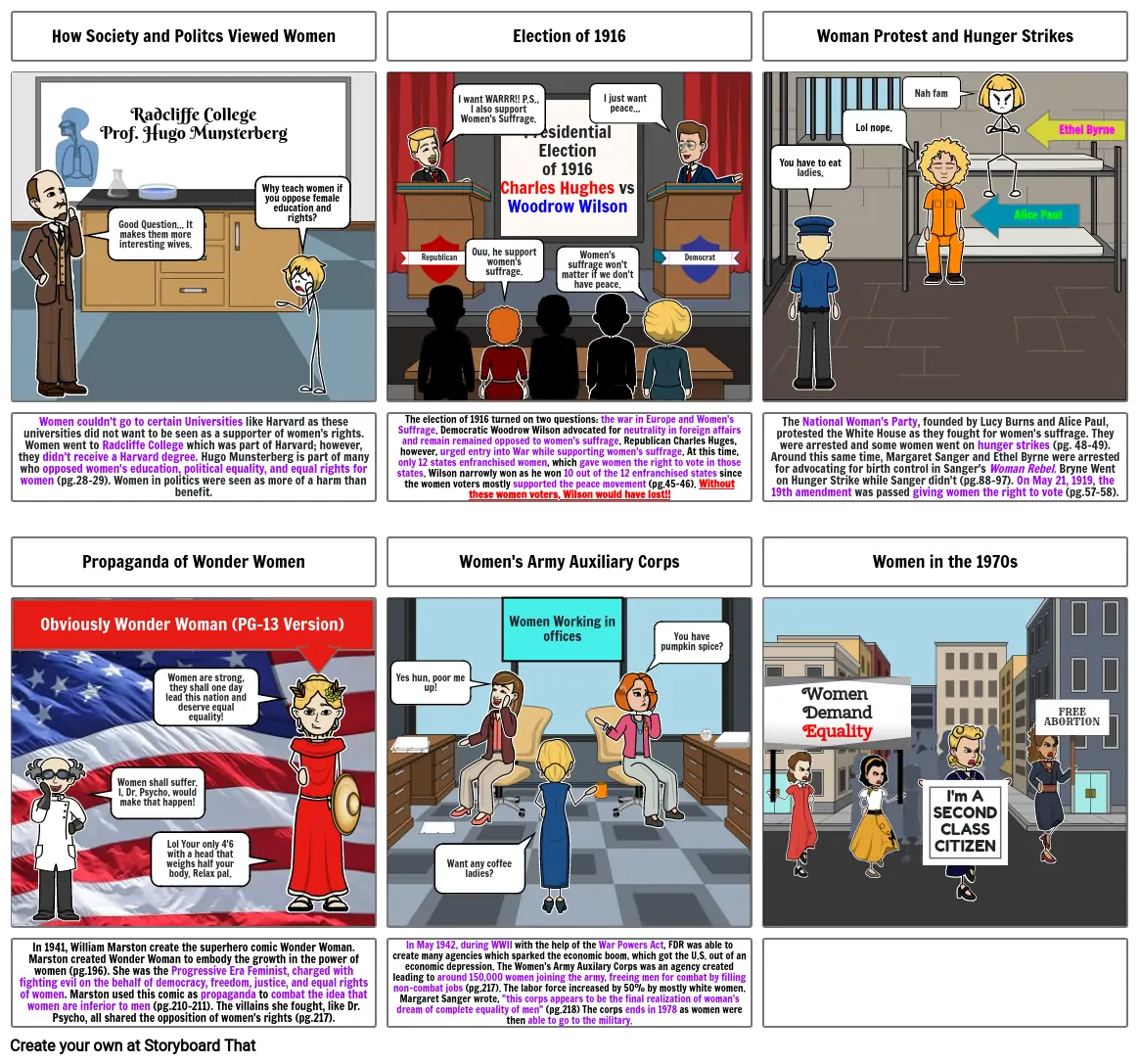Woman Politics in The Secret History of Wonder Women

Storyboard-Text
- How Society and Politcs Viewed Women
- Radcliffe CollegeProf. Hugo Munsterberg
- Good Question... It makes them more interesting wives.
- Why teach women if you oppose female education and rights?
- Election of 1916
- Republican
- I want WARRR!! P.S., I also support Women's Suffrage.
- Ouu, he support women's suffrage.
- Presidential Election of 1916Charles Hughes vs Woodrow Wilson
- Women's suffrage won't matter if we don't have peace.
- I just want peace...
- Democrat
- Woman Protest and Hunger Strikes
- You have to eat ladies.
- Lol nope.
- Nah fam
- Alice Paul
- Ethel Byrne
- Obviously Wonder Woman (PG-13 Version)
- Women couldn't go to certain Universities like Harvard as these universities did not want to be seen as a supporter of women's rights. Women went to Radcliffe College which was part of Harvard; however, they didn't receive a Harvard degree. Hugo Munsterberg is part of many who opposed women's education, political equality, and equal rights for women (pg.28-29). Women in politics were seen as more of a harm than benefit.
- Propaganda of Wonder Women
- Women are strong, they shall one day lead this nation and deserve equal equality!
- The election of 1916 turned on two questions: the war in Europe and Women's Suffrage. Democratic Woodrow Wilson advocated for neutrality in foreign affairs and remain remained opposed to women's suffrage. Republican Charles Huges, however, urged entry into War while supporting women's suffrage. At this time, only 12 states enfranchised women, which gave women the right to vote in those states. Wilson narrowly won as he won 10 out of the 12 enfranchised states since the women voters mostly supported the peace movement (pg.45-46). Without these women voters, Wilson would have lost!!
- Women's Army Auxiliary Corps
- Yes hun, poor me up!
- Women Working in offices
- You have pumpkin spice?
- The National Woman's Party, founded by Lucy Burns and Alice Paul, protested the White House as they fought for women's suffrage. They were arrested and some women went on hunger strikes (pg. 48-49). Around this same time, Margaret Sanger and Ethel Byrne were arrested for advocating for birth control in Sanger's Woman Rebel. Bryne Went on Hunger Strike while Sanger didn't (pg.88-97). On May 21, 1919, the 19th amendment was passed giving women the right to vote (pg.57-58).
- Women in the 1970s
- Women Demand Equality
- In 1941, William Marston create the superhero comic Wonder Woman. Marston created Wonder Woman to embody the growth in the power of women (pg.196). She was the Progressive Era Feminist, charged with fighting evil on the behalf of democracy, freedom, justice, and equal rights of women. Marston used this comic as propaganda to combat the idea that women are inferior to men (pg.210-211). The villains she fought, like Dr. Psycho, all shared the opposition of women's rights (pg.217).
- Women shall suffer. I, Dr. Psycho, would make that happen!
- Lol Your only 4'6 with a head that weighs half your body. Relax pal.
- In May 1942, during WWII with the help of the War Powers Act, FDR was able to create many agencies which sparked the economic boom, which got the U.S. out of an economic depression. The Women's Army Auxilary Corps was an agency created leading to around 150,000 women joining the army, freeing men for combat by filling non-combat jobs (pg.217). The labor force increased by 50% by mostly white women. Margaret Sanger wrote, "this corps appears to be the final realization of woman's dream of complete equality of men" (pg.218) The corps ends in 1978 as women were then able to go to the military.
- Want any coffee ladies?
- On August 26, 1970, a nationwide Women's Strike for Equality was held sponsored by the National Organization for Women. The protest focused on employment discrimination, political equality, abortion, free childcare, and marriage equality. In the late 1970s, the women's movement stalled as wages never reached parity, the social and economic gains were rolled back, and political and legal victories were within sight but never achieved. Then to add this hold-up, feminists were divided into (radicals and liberals) and "trashed" each other (pg.290).
- I'm A SECOND CLASS CITIZEN
- FREE ABORTION
Über 30 Millionen erstellte Storyboards

